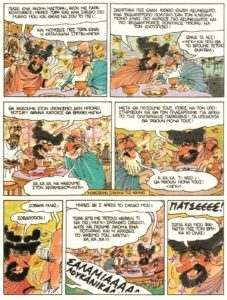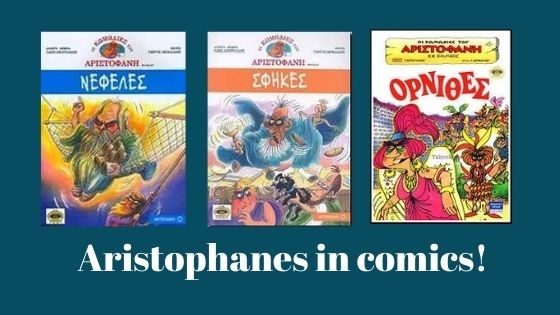stophanes in Comics? Yes it exists!
AriDiscover the works of the greatest representative of ancient Greek comedy, Aristophanes, through cleverly illustrated comics versions of his plays and learn more about the importance of comedy in ancient Greece.
Comedy in ancient Athens
Ancient Greek comedy was one of the three main dramatic forms of theatre in classical Greece; the other two were tragedy and the satyr play. The term classical Greece refers to the period from the beginning of the fifth century B.C and the death of Alexander the Great in 323 B.C. It was a period of intense conflict, first between the Greeks and the Persians, then between the Athenians and the Spartans. Aristophanes used the political circumstances of his time as the historical context for his comedies.
Besides Aristophanes, another very prominent playwright of the time was Menander.
The plays of both of them were characterized by the over-the-top satire of public people, criticism of political affairs and commentary on literary and philosophical topics. They were first performed in Athens as part of the religious celebrations in honour of the god Dionysus, who was the god grape-harvest, wine, fertility, festivity and theatre.
Structure of plays
The plays gradually took a standard structure which included the following parts:
- The introduction, where the main characters and the basic plot are explained;
- The parodos, where the chorus enters, i.e. a group of people who sing together.
The chorus was a vital part of all ancient Greek drama. It expressed the fears, hopes and ideas of the average citizens, which usually create a contrast to what the main characters are expressing. - The contest, a debate between the key opponents of the play;
- The parabasis, where the chorus addresses the audience directly and speaks to them about the ongoing affairs (often expressing criticism at prominent political or cultural figures);
- A series of scenes where absurdity takes place to make the audience laugh;
- A final banquet or a wedding scene, where everyone comes together in peace.
Who was Aristophanes & why is he so important?
Aristophanes is the most well-known representative of ancient Greek comedy (also known as Old Comedy).
As a result, Greeks call them “the Father of Comedy”. He was a very prolific writer but only 11 of his 40 comedies survive today.
Surprisingly, though, we know very little about him today – especially his personal life.
His work is the main source of information about him and his life.
The plays were performed at the great dramatic festivals of Athens in front of thousands of people and won several prizes.
We know now that his contemporaries were often afraid of his ridicule – his critique was very honest and straightforward, almost brutal. At the same time, since plays in ancient Athens were funded by the wealthy, which is why Aristophanes’ was often accused of keeping a conservative approach and toning down the political beliefs expressed in them to make them more palatable and find funding more easily.
The comic books
The Greek publishing house Metaixmio (Μεταίχμιο) has adapted Aristophanes’ eleven plays into comic books. Their aim is to familiarise both young (and older) audiences with the famous playwright’s critique of the sociopolitical situation of his time. They were created by comics writer Tasos Apostolidis and caricaturist/comics artist Yorgos Akokalidis and have sold more than 700k copies across the world and have been translated into many languages.
The comedies are illustrated in a caricature-esque, almost grotesque manner to further add to the humorous nature of the plays, using bold colours and strong lines.
The comic books are available both in Greek for intermediate and advanced learners who are looking for an alternative read as well as in English for beginner students.
Below you can find an abstract from the comedy Ιππής (en. The Knights), together with the Greek transcript of the conversation and translation in English:

- ιάσε ένα ακόμη μάστορα! Άκου, με παρακολουθείς; Μέρες τώρα έχω ένα σχέδιο στο μυαλό μου και θέλω να σου το πω!Mate, bring us another round! Listen, are you paying attention? I’ve come up with a plan for quite a while know and I want to tell you about it.Και νομίζεις πως τώρα είναι η κατάλληλη στιγμή;
And you think that now is the right moment?
Σκέφτηκα πως έναν αχρείο[1], έναν ασυνείδητο, ένα ξεδιάντροπο πολιτικό σαν τον Κλέωνα[2], μόνο ένας πιο αχρείος, πιο ασυνείδητος και πιο ξεδιάντροπος πολιτικός μπορεί να τον εκτοπίσει.
I was thinking that in order to replace a nasty, shameless politician without conscience like Cleon, you need to find someone who’s even nastier, more shameless and without conscience.
Ωραία τα λες! Που θα βρούμε τέτοιο φυντάνι;[3]
Sounds good! Where will we find someone like that?
Θα ψάξουμε στον υπόκοσμο, δεν μπορεί κοτζάμ Αθήνα, κάποιος θα βρεθεί.
We’ll look into the underworld. Athens is such a big city; we’re meant to find someone.
Χα χα χα, να ψάξουμε στον Κεραμεικό![4]
Hahaha we should look for him at Kerameikos.
Μετά θα πείσουμε τους Ιππείς[5] να τον υποστηρίξουν και θα τον πασάρουμε για αρχηγό της ολιγαρχικής παράταξης! Τα υπόλοιπα θα έρθουν από μόνα τους!
Then we’ll persuade the Knights (Ιππείς) to support him, and we’ll present him as the leader of the elite! The rest will follow.
Α χα χα, τι λέει; Θα έρθουν από μόνα τους!
Hahaha what are you saying? The rest will follow.
Σοβαρά μιλάς;
Are you serious?
Σοβαρότατα!
Dead serious!
Μήπως δε σ’ αρέσει το σχέδιο μου;
Don’t you like my idea?
Τώρα εγώ με τέτοιο κεφάλι τι να πω; Σατανικό σχέδιο! Άντε να πιούμε ακόμα ένα ποτηράκι και ν’ αρχίσεις το ψάξιμο του… ηγέτη! ΧΑ ΧΑ ΧΑ!!!
I’m so drunk that I don’t know what to say! Such an evil plan! Let’s have another drink and then you can start looking for…the leader! HA HA HA!!!
ΠΑΤΣΕΕΕΣ!
PATSEEEES! (this is a soup or stew made with tripe)
Σώπα και μου φαίνεται πως τον βρήκα κιόλας.
Shut up, I think I found him already.
[1] Αχρείος: vile, nasty, someone with low morals
[2] Cleon was an Athenian general during the Peloponnesian War. He is described as an immoral demagogue who wanted to persuade Athenians to continue the war against Sparta. Cleon was also a personal enemy of Aristophanes.
[3] Φυντάνι/φιντάνι: young person that is still developing and growing. Here it means someone with little or no experience in politics.
[4] Κακόφημη συνοικία της Αθήνας.
[5] Ιππής is the chorus in this comedy. They are supposed to be the wealthy Athenians who hate Cleon.
++++++++++++++++++++++++++++
In the mood to learn more about Greece , with interesting texts in Greek and English + Audio, made by Omilo teachers?
Then the eBook „Greece; The Ultimate Listening and Reading Comprehension eBook is exactly what you are looking for.





